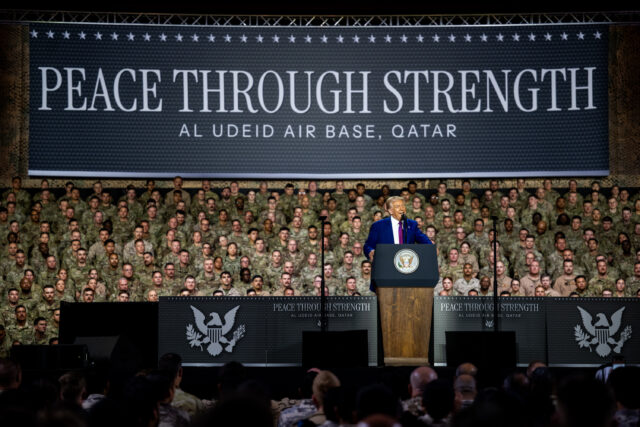
President Donald Trump’s speech in Riyadh was a drone strike on Western supremacism, “democracy-promotion,” and the “Arab Spring.” Like his 2020 “Vision for Peace,” which became the Abraham Accords, it was an invitation not an intervention.
He spoke in chapters, each covering an area of his – and hosts’ – interests.
Chapter 1: “Good News from a Place Called America,” touting his security, trade, and economic accomplishments.
Chapter 2: “Saudi Arabia: The Promised Land,” which he said without irony. Saudi social and economic movement into the framework of the 21st century was rightly lauded.
Chapter 4: “A land of peace, safety, harmony, opportunity, innovation and achievement, right here in the Middle East.” It began with the demise of ISIS and the constriction of Iran during Trump’s first term and included the Abraham Accords. Then a dump on the Biden administration – well deserved. Then back to the accomplishments of the Gulf States.
Chapter 5: “An offer to Iran.” Time-limited.
Chapter 6: “Making Peace is Better than Making War.”
Chapter 7: “But we will use our magnificent military when we have to.” Ask the Houthis.
Chapter 8: “October 7, 2023.”
Chapter 9: “Syria, Join the Party.”
Wait! What happened to Chapter 3?
That is, in fact, the crucial chapter and the one least remarked upon. It was a repudiation of colonialism – economic, social, governmental. It was a denunciation of European and American arrogance and a paean to Middle Eastern/Gulf State particularism.
It was well done.
This great transformation has not come from Western interventionalists or flying people in beautiful planes giving you lectures on how to live and how to govern your own affairs. No, the gleaming marvels of Riyadh and Abu Dhabi were not created by the so-called nation-builders, neocons or liberal nonprofits like those who spent trillions and trillions of dollars failing to develop Kabul, Baghdad…
The so-called nation-builders wrecked far more nations than they built, and the interventionalists were intervening in complex societies that they did not even understand themselves. They told you how to do it, but they had no idea how to do it themselves.
Neatly summed up is the wreckage of the “Arab Spring,” named so as to associate it with the 1968 Prague Spring and the sort of romantic and non-violent collapse of the Soviet Union and the freeing of Central Europe. But it was not the same and American – and broader Western – confusion caused enormous upheaval for the Arab people. Lifting the yoke of the Soviet Union from its western colonies restored Central Europe to its former position as part of Europe. “Europe, whole and free” said the Atlanticists – correctly – after fewer than 50 years of Soviet occupation.
In the Middle East, however, occupation and colonial rule had been the norm started conquering Middle Eastern territory around 3000 BCE. It ended with the post-colonial period of the 20th Century.
The reemergence of various Arab strains of thought – some modernist (like the UAE’s leaders), some radical Islamist (like the Ayatollah Khomeini), some secular (like Bashar Assad), some wanting to reach out to the West, some wanting to deny the West or blow it up – was ignored by Western modern colonialists, who were democracy-pushers believing our system was the only system, and who didn’t have patience for the Middle East, Levant, and African people or how they could reconcile their own divisions. If they could.
The UAE had a Mars mission in 2021. The chief scientist was Sara Al Amiri. Changes in the role of women was one way UAE adapted to the 21st century. In Afghanistan, a religious leader announced that women should only be allowed to see out of one eye – the burka should cover the other.
Trump’s choice always is the modern, free-market, capitalist West. Which was the point of the speech. But instead of telling them what to do, he offered them – even Iran and Syria and Qatar – a place at the table and the potential for what he believes is the best of all worlds.
There was a singular and important exception. He was explicit about October 7th. “All civilized people must condemn the October 7th atrocities against Israel… The people of Gaza deserve a much better future, but that will or cannot occur as long as their leaders choose to kidnap, torture and target innocent men, women and children for political ends.”
Yes.
Which leads to a final point. Aside from that, Israel was not mentioned in the speech, irritating some and frightening some. But the countries of the region know perfectly well that Israel made Trump’s offer viable and the choices possible: decimating Hamas and Hezbollah; making it untenable for Iran to stay in Syria and thus paving the way for the ouster of Asad; and proving that Iran is not invulnerable make it possible for them to choose the West.
Choose freedom. Choose modernity. Choose peace.
Will they? Can they?

